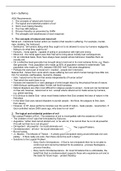Study guide
Philosophy - Evil & Suffering
Rating
Sold
-
Pages
5
Uploaded on
05-06-2019
Written in
2018/2019
AQA Religious Studies - Ethics - Philosophy - Evil & Suffering - Full in depth notes according to the specification, including quotes, key thinkers and everything needed to achieve an A*.
Institution
Module
Whoops, something went wrong.
Due to a technical error, we're unable to show you the document in the online viewer. Please try to download the file or get in touch with our support team.
Written for
- Study Level
- A/AS Level
- Examinator
- AQA
- Subject
- Religious Studies
- Unit
- AS Units 1 and 2 - Introduction to Religious Studies
All documents for this subject (61)
Document information
- Uploaded on
- June 5, 2019
- Number of pages
- 5
- Written in
- 2018/2019
- Type
- Study guide
Subjects
-
religious studies
-
a level
-
aqa
£5.65
Get access to the full document:
100% satisfaction guarantee
Immediately available after payment
Both online and in PDF
No strings attached
Get to know the seller
Tagetes_Cirrhitichthys.fasciatus
Also available in package deal

Package deal
Religious Studies AQA A Level - Philosophy Notes for Exam
8
2019
£ 57.57
More info

